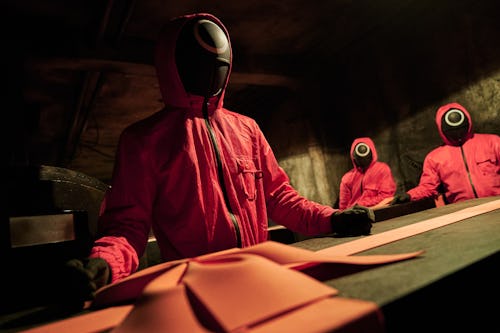
Let’s play a game. Ask five of your friends what they’re going to be for Halloween, and let’s each make a guess on how many would ponder a costume related to Squid Game. After all, you wouldn’t have too much trouble purchasing one — you can buy official merchandise (and knock-offs) for the show through Netflix’s online store, countless other retailers including Amazon, and as it was recently announced, through an official partnership with another mass marketer, Walmart.
As Netflix’s most successful show of all time continues to hold the world in its palm — the longevity of its complete cultural ubiquity is truly astonishing at this point — and we approach the Halloween season, we’re entering what is soon to be a consumerist flood for Squid Game products. T-shirts! Hoodies! Masks! And of course, the tracksuits!
In the recent Walmart partnership, the retailer is unveiling a feature called Netflix Fan Select, in which consumers can vote for the type of merch they want from Netflix shows, and Walmart will abide and offer the crowd-sourced products. In other words, democracy in action. Or, more specifically, democratized consumerism.
There is something inherently dark about this mass-consumerist outpouring facilitated by big corporations responding to the show’s fandom, in a way that is distinct from other fandoms, both because of the show’s specific themes and also the sheer size and rabidity of its viewership. By now, the show has been heralded in innumerable ways for tapping into the doom of our collective capitalist anxieties. As viewers of the show, we see an allegory of how we’re all trapped under a ceiling of economic desperation engineered through corporate capitalism — and we’re all getting sucked in enough to then go to said corporations, shelling out money to buy more of their stuff. Amid the Squid Game fervor, what we hate so much in the show is what we’re ironically buying into as fans. This is especially the case with a corporation like Walmart, which has had years of criticisms around underpaying employees and hurting local businesses.
To be clear, this isn’t to finger-wag at anyone buying a green tracksuit — the show is intensely immersive, and cosplay, of course, is just a fun way to connect further to universe of the show even after it’s ended. If anything, it’s just a much more boring, real-world version of what the show plays out — we might not enter into a death match in response to our helplessness at a deeply unequal world, but at least we can buy a few things.







